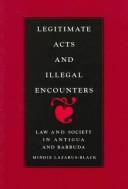Check nearby libraries
Buy this book

Legitimate Acts and Illegal Encounters examines three hundred years of social life on the Caribbean islands of Antigua and Barbuda to demonstrate the importance of law and the state in the creation of West Indian societies. Moving from the periods of slavery and emancipation under British colonial rule to recent independence, Mindie Lazarus-Black argues that the continuing struggle between lawmakers and the nonruling class has shaped the distinctive character of creole kinship, class, and gender.
Lazarus-Black analyzes historical and social transformation on the islands, using a theoretical framework drawn from Foucault's distinction between "systems of legalities" (the signs, symbols, and rituals of law) and "systems of illegalities" (common breaches of codes or explicit tolerance of illicit behaviors).
She documents the differences between local behavior and Antiguan law under slavery; the impact of family, labor, and poor laws on kinship relations in the post-emancipation era; and, in contemporary times, how men and women use the law in ways lawmakers never imagined - as when women take men to court as a form of ritual shaming. Her research reveals that the same laws used by ruling classes as tools for punitive definitions have served lower classes as instruments of both defense and resistance.
Legal strictures, she shows, have been used to keep the master class within its own written limits, to check elites' assumptions about the social world, and to push for a "justice" born of the experiences of the powerless.
As this book demonstrates, the investigation of law and judicial processes is as central to the history and the anthropology of the powerless as it is to that of the elites. The author's interdisciplinary analysis of the dynamics of and between domination and resistance in creole society will inform students of anthropology, history, law and society, Caribbean studies, and women's studies.
Check nearby libraries
Buy this book

Previews available in: English
Subjects
Customary law, Ethnological jurisprudence, Kinship (Law), Sociological jurisprudence, LAWS AND REGULATIONS, ANTIGUA AND BARBUDA, Droit coutumier, KINSHIP, Droit, Rechtsethnologie, Ethnologie juridique, Parents, Famille, Sociologie juridique, Law, caribbean area, Antigua, history, BarbudaPlaces
Antigua and BarbudaShowing 3 featured editions. View all 3 editions?
| Edition | Availability |
|---|---|
|
1
Legitimate acts and illegal encounters: law and society in Barbuda and Antigua
1994, Smithsonian Institution Press
in English
1560983272 9781560983279
|
zzzz
Libraries near you:
WorldCat
|
|
2
Legitimate acts and illegal encounters: law and society in Antigua and Barbuda
1994, Smithsonian Institution Press
in English
1560983272 9781560983279
|
aaaa
Libraries near you:
WorldCat
|
| 3 |
zzzz
|
Book Details
Edition Notes
Includes bibliographical references (p. 307-346) and index.
Classifications
The Physical Object
ID Numbers
Community Reviews (0)
Feedback?| July 25, 2024 | Edited by MARC Bot | import existing book |
| September 15, 2021 | Edited by ImportBot | import existing book |
| December 16, 2019 | Edited by ImportBot | import existing book |
| December 4, 2010 | Edited by Open Library Bot | Added subjects from MARC records. |
| December 10, 2009 | Created by WorkBot | add works page |












